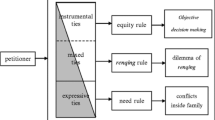Abstract
The sociological models of functionalism and conflict are introduced and utilized to analyze professionalism in the accounting profession as it is manifest in the American Institute of Certified Public Accountant's Code of Conduct. Rule 203 of the Code and provisions of the Code related to the public interest are examined using semiotic analysis to determine if they are most consistent with the functionalist or conflict models. While the analysis does not address intent of the Code, it is determined that the Code contains semantic defects which result in different interpretations of the Code to different readers. The defects found are most consistent with the conflict model of professionalism. This has implications for the public and for individuals within the profession, making the Code less useful to both groups. The defects are seen as a potential battleground for the self-interest vs the public interest orientation of the accounting profession.
Similar content being viewed by others
References
American Institute of Certified Public Accountants: 1988, Code of Conduct (AICPA, New York).
Daniels, A. K.: 1973, 'How Free Should Professions Be?', in Professions and Prospects (Sage Publications, Beverly Hills/London).
Epstein, M. J. and A. D. Spaulding: 1993, The Accountant's Guide to Legal Liability and Ethics (Irwin, Homewood, Illinois).
Hauptman, R. and F. Hill: 1991, 'Deride, Abide or Dissent: On the Ethics of Professional Conduct', Journal of Business Ethics 10, 37–44.
Johnson, Terence: 1972, Professionalism and Power (The MacMillan Press, London).
Kemper, T. D.: 1976, 'Marxist and Functionalist Theories in the Study of Stratification: Common Elements that Lead to a Test', Social Forces 54, 559–578.
Kultgen, J.: 1988, Ethics and Professionalism (University of Pennsylvania Press, Philadelphia).
Kultgen, J.: 1983, 'The Ideological Use of Professional Codes', Business and Professional Ethics Journal 1(3), 53–69.
Larson, M. S.: 1977, The Rise of Professionalism: A Sociological Analysis (University of California Press, Berkley).
McDowell, B.: 1991, Ethical Conduct and the Professional's Dilemma: Choosing Between Service and Success (Quorum Books, New York).
Newton, L.: 1982, 'The Origin of Professionalism: Sociological Conclusions and Ethical Implications', Business and Professional Ethics Journal 1(4), 33–43.
Parsons, Talcott: 1954, 'The Professions and Social Structure', Essays in Sociological Theory (The Free Press, Glencoe, IL).
Ruland, R. and C. Lindblom: 1992, 'Ethics and Disclosure: An Analysis of Conflicting Duties', Critical Perspectives on Accounting 3, 259–272.
Author information
Authors and Affiliations
Rights and permissions
About this article
Cite this article
Lindblom, C.K., Ruland, R.G. Functionalist and Conflict Views of AICPA Code of Conduct: Public Interest vs. Self Interest. Journal of Business Ethics 16, 573–582 (1997). https://doi.org/10.1023/A:1017950006942
Issue Date:
DOI: https://doi.org/10.1023/A:1017950006942




